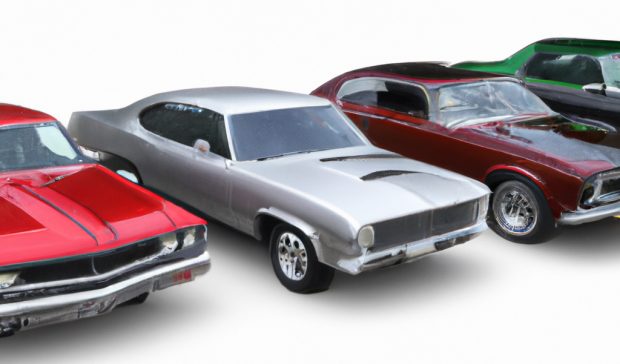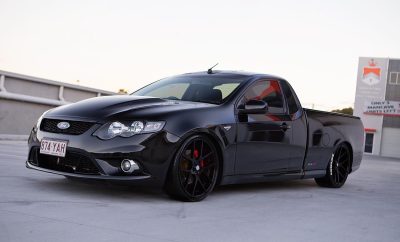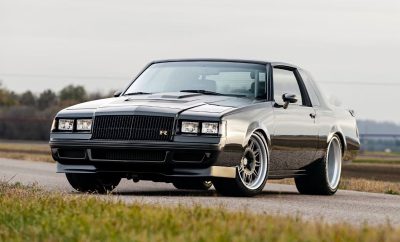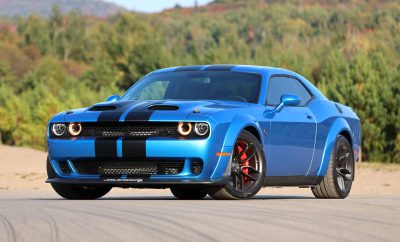Best Muscle Cars
Highly Regarded American Muscle Cars

From drag strips to car shows, American muscle cars have been a beloved part of the automotive landscape for years. Throughout the golden era of muscle cars, these powerful machines made an indelible mark in history due to their giant torque-rich engines and unique styling. With awesome-looking cars like the Ford Mustang Shelby GT500, Plymouth Barracuda, and Baldwin-Motion Phase III GT Corvette, it’s no wonder why these cars remain so iconic today.
If you’re a classic car enthusiast or collector, American muscle cars are certainly worth considering. While it’s certainly possible to find affordable models (like a 1966 Plymouth Barracuda for $5,500), some of the rarer ones can fetch an impressive amount at auction. For example, a 1967 L88 Corvette Convertible, 1971 Hemi Cuda Convertible 4-Speed, a 1967 Chevrolet Corvette L88 2-Door Coupe, and a 1962 Shelby Cobra CSX2000 sold for $3.2 million, $3.5 million, $3.85 million, and a whopping $13.75 million, respectively.
However, even though emissions standards and other regulations tamed muscle cars in the 1980s, many of these cars are still filled with stories and badass power. So, without further ado, here’s a list of some of the most badass American muscle cars ever made.
2019 Dodge Challenger Redeye
For the modern muscle car enthusiast, the Challenger Redeye is definitely worth checking out. Even though it’s a hefty 4,514 pounds, it’s powered by a 797-hp engine under the hood. Not only that, but with its classic muscle car looks, it also features all of the modern amenities and features we’ve come to appreciate.
1966 Plymouth Barracuda
At first glance, the ’66 Barracuda looks like a low-slung muscle car with a massive rear window that gives it a distinctive look. It’s also one of the more affordable muscle cars on this list, since they’re relatively easy to find.
Barracudas are also noteworthy for being serious high-performance machines right out of the box. Despite this, some buyers felt like the cars were overly expensive, which is probably why Shelby made some features like adjustable Koni shocks, a fiberglass hood, and a Detroit Locker Rear Differential optional.
1968 Ford Mustang Shelby GT500
The Mustang Shelby GT500 is among the most desirable cars for Mustang purists. The 1965 and 1966 GT 350s had a lightweight design, perfect for racing on the track. But the later 1967 and 1968 models were the ones to own if you wanted to win drag races.
With significantly more power and torque than earlier models, these cars could hit 60mph in the mid-to-low 14 second range, thanks to 428 cu in V8 engine. The Shelby Mustangs also featured more scoops and flashier styling than older models, making them even cooler.
Ford Mustang Boss 429
The 1969 Boss 429 was an incredibly limited edition muscle car from Ford. It featured an impressive 375 horsepower engine and could reach a top speed of 126 mph. Despite the underside of the hood being cramped and the fuel economy being appalling, the Boss still stands as one of the most desirable muscle cars ever made.
1969 ½ Dodge Super Bee A12
The Dodge Super Bee A12 was a muscle car with a bold hood and huge forward-facing scoop. It also featured a 440 Magnum engine and Edelbrock intakes. After the engines received regular production status, Chrysler-cast aluminium intakes were fitted at the plant.
1970 Chevrolet Chevelle SS 454
The Chevelle SS 454 was a force to be reckoned with. With its massive 454 cu in V8, the car could pump out up to 450 horsepower and 500 lb-ft of torque, was capable of achieving a top speed of nearly 140 mph. This powerful engine was mated to a heavy-duty three-speed manual transmission and a limited slip differential, allowing the Chevelle SS 454 to achieve 0-60 times of 6.3 seconds.
1984 Chevy Corvette
The C4 Corvette was highly anticipated before its launch, with some speculating that it would feature a mid-engine chassis like a European exotic. In the end, the 1984 Corvette featured a transverse-mounted engine, along with other performance upgrades.
Designed to win races on the superspeedways, the car was lightened up and featured modifications to its body to reduce drag. This included a huge rear wing that was designed to allow the trunk lid to open fully.
1970 Plymouth Hemi Cuda
When it comes to muscle cars, the Plymouth Hemi Cuda is undeniably one of the most revered and sought-after cars ever made. It was designed to compete with and beat the Corvette Stingray on the drag strip, and with its 425 horsepower V8 engine, it certainly delivered. The 440 and 426 Hemi V8s packed quite a punch and gave the car some serious acceleration.
1971 Pontiac GTO Judge
The 1971 Pontiac GTO Judge was one of the most iconic muscle cars of its time. From its racy design to its impressive performance, this car was a force to be reckoned with. It was equipped with a 455 cubic inch V8 engine that put out 370 horsepower, and combined with its lightweight body and responsive handling, the GTO Judge was a formidable adversary on the drag strip.
1969-1971 Baldwin-Motion Phase III GT Corvette
With legendary status among muscle car lovers, Baldwin-Motion Corvettes were delivered from a dealer in Baldwin, New York to Motion Performance speed shop down the road. Joel Rosen wanted to create a fast, functional all-American GT that fused Italian and American workmanship, resulting in a 3,300-pound sports car.
Powered by an AMC 390-cid V8, the Phase III GT Corvette was capable of 340 hp, making it quite a beast in its day. The cars were so popular that more than 25 went into production, with one fetching nearly $900,000 at an auction in 2017.
1968 Ford Torino GT
The Torino GT was Ford’s answer to the mid-size muscle car market in 1968. It featured a 390 cubic inch V8 that put out 335 horsepower, giving the car enough power to keep up with its competitors. In addition to its potent engine, the Torino GT also boasted an attractive design and generous list of features, making it a great car for cruising and racing alike.
1969 Dodge Charger RT
The 1969 Dodge Charger RT is one of the most iconic American muscle cars ever made. It was powered by a 375 horsepower 440 Magnum V8 engine, making it one of the fastest vehicles on the street. The Charger RT is also known for its signature cosmetics, including its menacing grille, aggressive hood scoop, and sleek bodylines.
1970 Buick GSX Stage I
The Buick GSX was a powerful, yet luxurious muscle car released in 1970. It featured Buick’s biggest engine — a 455 cubic inch V8 — that put out 360 horsepower. It also had plenty of other performance goodies, like a Hurst four-speed transmission, a Quick Response Suspension package, and an optional air induction system.
1973 Pontiac Trans Am SD-455
The 1973 SD-455 Trans Am was Pontiac’s last hurrah before emissions standards started strangling performance. This car was equipped with an incredible high-output 455 cubic inch V8 engine that generated 290 horsepower. The grand finale was the legendary Super Duty option, which added an additional 10 horsepower and an aluminum intake manifold.
1979 Pontiac Firebird Trans Am
The 1979 Pontiac Firebird Trans Am represented the pinnacle of Pontiac performance. It was powered by a 400 cubic inch V8 engine with a four-barrel carburetor and Ram Air induction, giving it a whopping 220 horsepower. The car also featured a stiff suspension, a fist-shifting four-speed manual transmission, and four-wheel disc brakes.
1984 Chevrolet Monte Carlo SS
The Monte Carlo SS was a classic boulevard cruiser, but it was also capable of handling the occasional track day. It was powered by a 5.0 liter V8 engine that produced 180 horsepower and a hefty 275 lb-ft of torque. Coupled with its light weight, the Monte Carlo was one of the most well-rounded muscle cars of its time.
Conclusion
Throughout the golden era of muscle cars, American automakers created some awesome vehicles that remain popular and powerful today. From drag strips to collector cars, muscle cars offer plenty of fun, power, and style. With iconic cars like the Ford Mustang Shelby GT500, Plymouth Barracuda, and Baldwin-Motion Phase III GT Corvette, these badasses remind us why they’re still so beloved.









0 comments